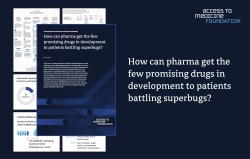Date
23 May 2024
Getting new antimicrobials to patients combatting drug resistance
Direct links
The article underlines that while there are a limited number of antimicrobial projects currently underway, antimicrobial drugs that are currently in late-stage clinical development can make a significant impact on the worsening superbug crisis if effective stewardship plans are put in place.
It also provides context on the drugs in scope of the report (gepotidacin, olorofim, zoliflodacin, and Venatorx) and the diseases which they aim to treat.
The article summarises the report’s insights and recommendations into four key points:
There is a lack of concrete drug registration plans by pharma in LMICs.
Research planning overlooks affordability and stewardship in LMICs.
The presence of pediatric trials before market approval is a positive sign for treatment in children, who are particularly vulnerable to drug-resistant infections.
While partnerships improve scalability, other tools that can improve access and stewardship are underused.
